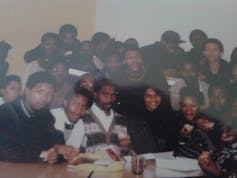
Decolonisation and Africanisation may appear to be new ideas on South Africa’s higher education landscape. But a tertiary college established nearly 30 years ago shows that this is not the case. The story of Khanya College proves that decolonised learning – rooted in Africa but infused with global influences – is entirely possible.
Khanya College didn’t use the words “decolonisation” or “Africanisation”, but these were strong themes in its work. It gave students confidence and aimed to empower them by strengthening their identity of where they came from based in part on their African history, language and traditions. This can be labelled “powerful knowledge”.
The institution also taught students “knowledge of the powerful”. This was needed for the graduates to be able to act and adapt within a white, elite, English educational system. It taught them to recognise – and challenge – the implicit rules.
Khanya still exists today, though in recent years it has become a non-governmental organisation rather than a formal college.
Its history as a college that opened the doors of white universities to black students during apartheid holds three key lessons for higher education in South Africa today. These relate to empowering students through an African and global curriculum; encouraging critical thinking; and transforming universities and society.
Empowerment through an African curriculum
Khanya College was established in 1986, when the apartheid system was starting to unravel. The South African Committee of Higher Education, led by renowned educationalist Neville Alexander, established the college to address the limitations of apartheid’s educational system.
Khanya College allowed students who were classified as “black” by apartheid legislation the chance to gain access to universities classified as “white”. Its campuses, in Johannesburg and Cape Town, primarily targeted young black South Africans. In the first three years of its existence, more than 400 students completed the Khanya course of study.
Staff were also drawn from across “race” groups. Professor Rajani Naidoo, one of the authors of this article, was involved in Khanya’s programme from its launch until 1991.

One of Khanya’s big goals was to act as a model for the transformation of all universities in South Africa. It employed a strategy of knowledge for liberation. This work was an attempt to facilitate students’ access to powerful knowledge held by dominant groups in society.
The college wanted to break away from apartheid education’s emphasis on mainly Afrikaner history and the sole study of Europe as world history. Instead, the emphasis included oral African literature and African history taught from a critical perspective.
The teaching philosophy was twofold: first, it aimed to give students confidence and empower them by strengthening their identity of where they came from based in part on their African history, language, traditions and social class.
The staff wanted to create an environment in which students acknowledged and were proud of their own identity. This was the first, crucial step to support students in understanding how to navigate their way through a dominant culture.
Secondly, it taught students the curriculum they needed to know how to succeed in a white, elite university. The students were introduced to the dominant discourses and practices within elite universities; they were taught to understand and evaluate these practices. Then they were supported in finding the tools to challenge such practices.
- Also read: SA universities drop in global rankings
In contrast to some proponents of Africanisation today, Khanya College did not disregard so-called Western knowledge. Instead it drew the best from critical thinkers worldwide to develop students’ own critical insights.
Some students were political activists who were accepted on the basis of their community involvement rather than strictly academic results. At Khanya, their political work was linked to more formal modes of critical analysis.
For example, the African literature course included formal text analysis. Students learned about the social, economic and political conditions of production of the text and its real world implications, including insights for their own organisations and community groups.
Pamphlets were created to raise popular awareness about apartheid and students developed strategies towards alternative higher education systems.
This work, rooted in Brazilian theorist Paulo Freire’s principle of education for liberation, was designed to transform universities – and, in the long term, to help Khanya’s students contribute to transforming South African society.
The lessons
Apartheid rendered the divisions based on “race” and disadvantage extremely visible. We would suggest, then, that apartheid South Africa was an extreme case of the social fault lines that divide many societies today – both in the Global North and in the Global South.
The story of Khanya College has important lessons to offer that remain relevant today. Its approach was developed in a different time and societal context, but can contribute a great deal to contemporary debates about decolonising and transforming universities worldwide.
For instance, it shows how a curriculum can be Africanised without essentialising what it means to be African and what African knowledge is. It also shines a light on how crucial it is to understand the importance of access to the knowledge of the powerful, what aspects of this are valuable and how it can be critiqued.
Finally, by using these classic virtues of the university – constructive criticism and dissent – Khanya College contributed to the skills students needed to constructively transform the university and, ultimately, society.
![]() This article is adapted from a chapter in the book Higher Education and Capacity Building in Africa.
This article is adapted from a chapter in the book Higher Education and Capacity Building in Africa.
Hanne Kirstine Adriansen, Associate Professor, School of Education, Aarhus University; Lene Møller Madsen, Associate professor in Science Education, University of Copenhagen, and Rajani Naidoo, Professor and Director, International Centre for Higher Education Management, School of Management, University of Bath
This article was originally published on The Conversation. Read the original article.
Read more:
- Decolonisation: Academics must change what they teach, and how
- When universities aren't properly funded, everybody loses
- South Africa's universities and colleges: contact details
What kind of changes should be made to the curricula and our institutions to decolonise it? Do you think we could take a similar approach to do and actually decolonise education? Share your thoughts and opinions by emailing chatback@parent24.com and we may publish it. Should you wish to remain anonymous, please let us know.
Sign up to our weekly newsletter to receive Parent24 stories directly to your inbox.




 Publications
Publications
 Partners
Partners










